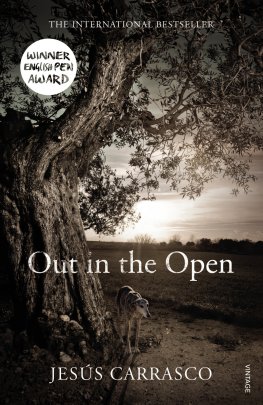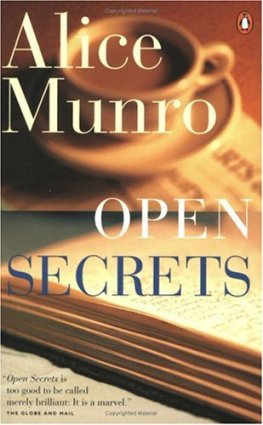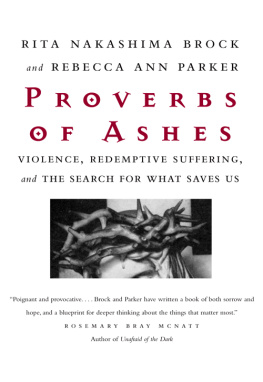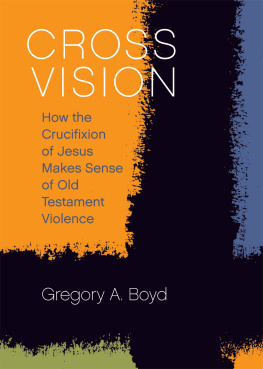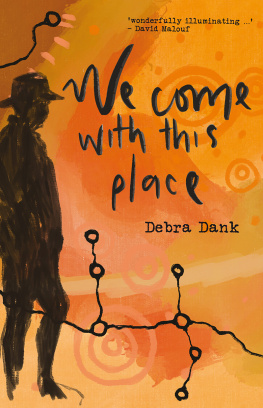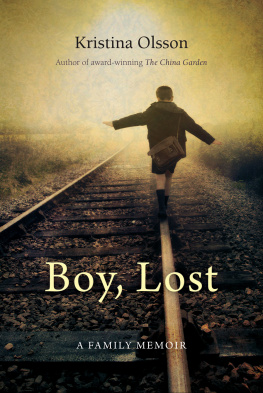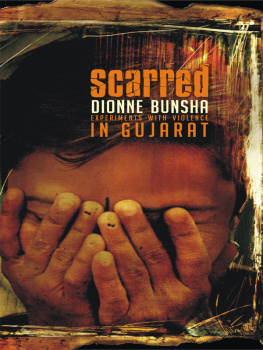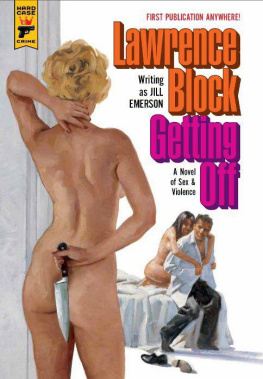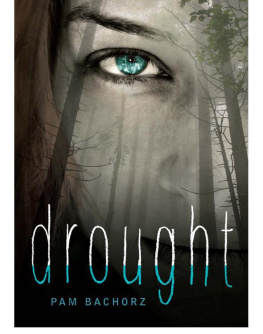Jess Carrasco
Out in the Open
A young boy has fled his home. Crouched in his hiding place he hears the shouts of the men hunting him. When the search party has passed, what lies before him is an infinite, arid plain, one he must cross in order to escape those from whom hes fleeing. One night he crosses paths with an old goatherd and from that moment nothing will ever be the same for either of them.
Out in the Open tells the story of a boy in a drought-stricken country ruled by violence. A closed world where names and dates dont matter, where morals have drained away with the water. In this landscape the boy, not yet a lost cause, has the chance to learn the painful basics of judgement, or to live out forever the violence with which he grew up.
Jess Carrasco was born in Badajoz in 1972 and currently lives in Seville. Since 1996 he has worked as an advertising copy writer. His first novel, Out in the Open, was declared Book of the Year by booksellers in Madrid. The Dutch translation was longlisted for the European Literature Prize 2014. Out in the Open will be published in seventeen countries around the world.
To the memory of Nicols Carrasco Royano
FROM INSIDE HIS hole in the ground, he heard the sound of voices calling his name, and, as if they were crickets, he tried to pinpoint the precise location of each man within the bounds of the olive grove. The desolate howling of fire-scorched scrub. He was lying on one side, knees drawn up to his chest, with barely enough room to move in that cramped space. His arms either around his knees or serving as a pillow, and only a tiny niche for his knapsack of food. He had made a roof out of pruned twigs which he had piled on top of two thick branches that served as beams. Tensing his neck, he raised his head so as to hear better and, half-closing his eyes, listened out for the voice that had forced him to flee. He didnt hear it, nor did he hear any barking, which was a great relief because he knew that only a well-trained dog could find him in his hiding-place. A gun dog or a truffle hound. Perhaps an English bloodhound, with sturdy legs and floppy ears, like the one hed seen in a photo in a newspaper brought from the city.
Luckily for him, there were no such exotic breeds where he lived. Only greyhounds. All skin and bone. Mystical creatures that raced after hares at top speed, never stopping to follow a scent because they had been put on earth with only one purpose in life: to pursue and capture. They had red lines emblazoned on their flanks, souvenirs of their masters whips. The same whips that were used to beat into submission the children, women and dogs of that arid plain. Greyhounds, of course, could run, whereas he had to lie stock-still in his small clay cave. Lost among the hundreds of smells that the subterranean depths normally reserve for earthworms and the dead. Smells he should not be smelling, but which he himself had sought out. Smells that distanced him from his mother.
Whenever he saw greyhounds or thought of them, he always remembered a man who used to live in his village. A cripple who moved about the streets on a kind of tricycle propelled by a handle that he turned, bending over it like an organ-grinder. At dusk, he would leave the houses of the village behind him and travel the beaten paths heading north, the only ones his chariot could manage. The dogs escorted him, tethered with leads made of frayed string. It was painful to see him trundling along on his ramshackle machine, and the boy had often wondered why he didnt get the dogs to pull him. His classmates used to say that when the cripple had no further use for one of those dogs, he would hang it from an olive tree. In the boys short life, he had seen dozens of dogs hanged by the neck from remote trees. Bags full of dislocated bones like giant chrysalises.
He sensed that the men were getting very close now and so he lay utterly still. He heard his name proliferating among the trees like drops of rain falling onto a sheet of water. Curled up in his hiding-place, he wondered if that would perhaps be his one reward: hearing his name called out again and again at daybreak among the olive trees. He recognised two voices, one belonging to the landlord of the local bar and the other to one of the muleteers who spent the summer in the village. And although he couldnt actually identify their voices, he imagined that the postman and the local basket-weaver would be there too. Down in the depths of his hole, he experienced an unexpected warm rush of joy. A kind of silent, childish jubilation that made his skin prickle. He wondered if they would put such effort into finding his brother. Would he have attracted such a large search party? Hearing that chorus of voices, he felt that he had perhaps revived some kind of community spirit and, for a moment, his bitterness withdrew into one small corner of his stomach. He had gathered around him all the men of the village, all the strong, weather-worn arms that tilled the fields and sowed the furrows with grain. He had caused an incident. Perhaps the need to come together had forced old enemies to roll up their sleeves and work alongside each other. He wondered if anything would remain of that moment in a few years or even weeks. If it would still be a topic of conversation as people left church or the local bar. Then he thought about his father and imagined him making his excuses to all and sundry. He saw him, as he so often had, feigning helplessness. Probably trying to make everyone believe that his son had fallen down some hidden well while chasing after a young partridge, that the family had once again been the victim of misfortune and that God had just torn from him flesh of his flesh. Even with his head pressed against his knees, the boy managed to shake it gently as if to chase away those thoughts. The image of his fawning, servile father came back to him, this time in the company of the bailiff. A scene which, like no other, provoked all kinds of chaotic feelings in his body. He listened as intently as he could for traces of the bailiffs voice, and even the absence of that voice frightened him. He imagined him walking along, cigar in mouth, behind the line of men currently combing the olive grove. He would trample the clods of earth or bend indolently down to pick up the odd olive that had escaped the last harvest. His watch-chain poking out beneath his jacket. His brown felt hat, his bow tie, tight collar, moustache stiff with sugar water.
A mans voice just yards from the hole startled him from his thoughts. It was the schoolmaster. He was talking to another man some way off. The boy felt his heart beat faster, felt the blood hammering in his veins. After hours of immobility, the cramps in his muscles were urging him to leave his hiding-place. He considered bringing the whole situation and his discomfort to an immediate end. After all, he hadnt killed anyone, he hadnt stolen, he hadnt taken the name of God in vain. He was on the point of moving the twigs covering the hole in order to attract the attention of the men nearest to him. One of them would tell the other to be quiet and then turn his head so as to hear where exactly the noise had come from. Their eyes would meet. They would creep towards the pile of twigs, not knowing whether they would find a rabbit or the lost boy. Then they would move the twigs to one side and find him there, curled into a ball. He would pretend to be unconscious, and his unconscious state, along with the mud, wet clothes and dirty hair, would be his masterstroke. He would at least be assured of one moment of glory. Not that it would last, of course, more a case of feast today and starve tomorrow. Then, summoned by the mens shouts, the others would come running. His father would arrive, breathing hard, initially thrilled and happy. They would form a whirlpool of people around him that would barely let him breathe, like a newly struck match that struggles at first and shows no sign of becoming the mellifluous flame that will eventually consume the matchstick. They would disinter him amid shouts of joy. Around him, manly embraces would send up little clouds of dust as the searchers clapped each other on the back. Then, to the accompaniment of songs and warm wine, he would be carried to the village on a stretcher with his fathers rough hand resting on his small, brown chest. A joyful exordium to a drama that would propel them all to the village bar and, later, to their respective houses. Afterwards, the only witnesses would be the thick stone walls that supported the roof and kept the rooms cool. A communal prelude to his fathers worn leather belt. The swift copper-coloured buckle slashing dully through the fetid kitchen air. His earlier feigned state of unconsciousness getting its unjust deserts.

